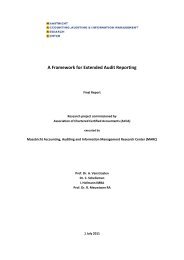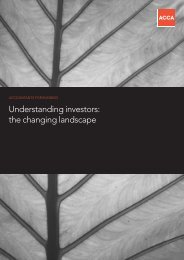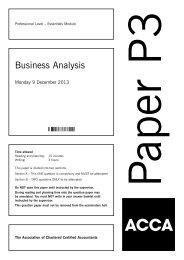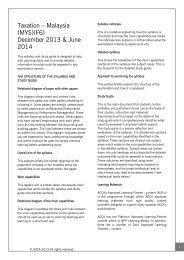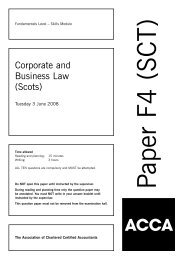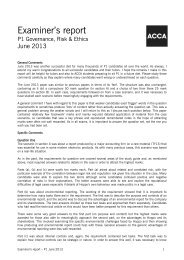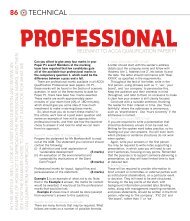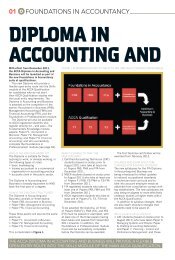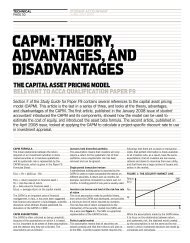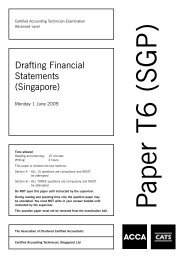June 2009 Answers - ACCA
June 2009 Answers - ACCA
June 2009 Answers - ACCA
You also want an ePaper? Increase the reach of your titles
YUMPU automatically turns print PDFs into web optimized ePapers that Google loves.
<strong>Answers</strong>
Fundamentals Level – Skills Module, Paper F4 (MYS)<br />
Corporate and Business Law (Malaysia) <strong>June</strong> <strong>2009</strong> <strong>Answers</strong><br />
1 This question on the Malaysian legal system tests the candidates’ knowledge of the concept of human rights as well as the<br />
provisions in the Federal Constitution which protect such rights.<br />
(a) Human rights may be defined as the basic rights that all human beings are entitled to enjoy. Section 2 of the Human Rights<br />
Commission of Malaysia Act 1999 defines human rights to mean the fundamental liberties provided for under the Federal<br />
Constitution of Malaysia.<br />
(b) The provisions of the Federal Constitution which protect human rights are the fundamental liberties stated in Part II. These<br />
are listed and explained below:<br />
1. No person may be deprived of his life or personal liberty except in accordance with the law.<br />
By this provision, individuals are protected from being unlawfully imprisoned or put to death. An individual who is<br />
unlawfully detained, may obtain an order of the court through a writ of ‘habeas corpus’. This is an order of the court<br />
requiring that he be lawfully charged in court or be released. However, this right is not absolute. A person may still be<br />
deprived of his life or liberty in accordance with the law. Thus the Internal Security Act 1960, which was passed under<br />
powers conferred by Art.149 of the Constitution permits, among other things, preventive detention.<br />
2. No person may be subject to slavery or forced labour.<br />
The constitution recognises that individuals should not be regarded as the property of others and thus bans all forms of<br />
slavery and forced labour.<br />
However, this right of the individual is given subject to the paramount interest of the nation. Thus, Parliament may make<br />
laws providing for compulsory national service.<br />
3. No person can be punished under a law which was not in force when the alleged crime was committed. This protects<br />
the individual from being charged with a crime that was not recognised as a crime at the time the alleged wrongful act<br />
was done. Thus, laws against crimes cannot be passed with retrospective effect.<br />
4. A person cannot be tried more than once for the same crime of which he has already been acquitted or convicted earlier.<br />
This right recognises that an individual should not be placed in a position of double jeopardy, where he is made to<br />
undergo more than one trial for the same offence if he has already previously been tried and either acquitted or<br />
convicted. However, this does not apply in cases where a higher court has quashed an earlier trial and ordered a<br />
re-trial.<br />
5. All persons are equal before the law and entitled to its protection. However, this right is subject to some exceptions.<br />
These include, among other things:<br />
(i) any provision regulating personal law<br />
(ii) any provisions or practice restricting matters connected with religion to persons professing that religion only<br />
(iii) any provision for protection, well being or advancement of the aboriginal peoples of the Federation<br />
(iv) any provision restricting enlistment in the Malay regiment to Malays.<br />
In addition, State laws may provide for reservation of land for Malays. See: Art 89 and 90.<br />
6. Citizens cannot be discriminated against in relation to appointment to any office or employment under a public authority,<br />
or in relation to acquisition of property, establishing or carrying on of any trade, business, profession, vocation or<br />
employment, merely on grounds of religion, race, descent or place of birth. However, this right is subject to Article 153<br />
of the Federal Constitution, which permits the granting of special privileges to bumiputras.<br />
7. Citizens cannot be discriminated against in relation to the providing of education, merely on grounds of religion, race,<br />
descent or place of birth. This again is subject to Article 153 as stated above. (Art 153 is discussed below)<br />
8. Freedom of religion<br />
The constitution also entrenches the right of the individual to profess, practice and propagate his own religion. However,<br />
as Islam is the religion of the country, restrictions may be placed upon the propagation of other religions among Muslims.<br />
9. No citizen may be banished from the country. However, this right is subject to exceptions whereby the Federal<br />
Government is permitted to deprive a person of his citizenship under certain circumstances.<br />
10. Every citizen has the right to freedom of speech, peaceful assembly and association. However, in the interests of security,<br />
public order or morality, Parliament may impose certain restrictions. For example, the Sedition Act 1948 provides that<br />
it is an offence to question the sovereignty, powers and prerogatives of the rulers and the special position of the Malays.<br />
Further, the freedom of speech does not entitle a person to defame another. A person defamed has a right to sue under<br />
the law of defamation.<br />
It is important to note that a number of these liberties may be overridden by Art 149 and 150 of the Constitution. Among<br />
other things, Article 149 empowers parliament to make laws against subversion, whether or not an emergency is proclaimed.<br />
Such laws may be inconsistent with a number of the entrenched fundamental liberties such as liberty of the person, free<br />
movement and freedom of speech, assembly and association. An example is the Internal Security Act 1960.<br />
(Candidates are only expected to explain any FOUR of the above rights).<br />
7
2 This question on employment law contains two parts. Part (a) tests the candidates’ knowledge on the ways in which contracts of<br />
employment may be terminated under the Employment Act 1955. Part (b) tests the candidates’ knowledge on what constitutes<br />
‘due enquiry’ for the purpose of dismissing an employee for misconduct.<br />
(a) Under the Employment Act 1955 a contract of service may be terminated as follows:<br />
(i) A contract of service for a specified period of time or for the performance of a specified piece of work will terminate<br />
automatically when the specified period of time has elapsed or the specified piece of work has been completed (s.11(1)).<br />
(ii) A contract of service may also be terminated by one party giving to the other notice of his intention to terminate it<br />
(s.12(1)). Section 12(4) requires the notice to be in writing. The notice may be given at any time but must comply with<br />
the period of notice stated in s.12(2).<br />
(iii) Either party to a contract of service may terminate it without notice (or if notice has already been given in accordance<br />
with s.12, without waiting for the expiry of the notice) by paying an indemnity to the other (s.13). The indemnity must<br />
be a sum equal to the amount of wages that would have accrued to the employee during the period of notice required<br />
under s.12 or during the unexpired term of such notice.<br />
(iv) Either party to a contract of service may terminate it without notice in the event of a wilful breach, by the other party,<br />
of a condition of the contract of service (s.13).<br />
(v) An employer may terminate the contract of service, without notice, on the grounds of misconduct of the employee after<br />
due inquiry (s.14). The section also allows an employee to terminate his contract of service without notice, where he<br />
or his dependants are immediately threatened by danger of violence or disease which was not undertaken by the<br />
employee in his contract of service.<br />
(b) By s.14 of the Employment Act 1955 the employer may dismiss the employee without notice on the ground of misconduct<br />
by an employee. However, the employer may only do so after ‘due inquiry’.<br />
The Employment Act does not state what constitutes ‘due inquiry’. However, reference may be made to the following<br />
guidelines laid down by the Industrial Court in the case of KJJ Cleetus and Unipamol (M) Sdn Bhd (IC Award 66 of 1975):<br />
(i) the inquiry is to be instituted as early as possible after the suspension of the complainant;<br />
(ii) the complainant is to be given particulars of the misconduct, preferably in writing; and a reasonable time is to be given<br />
to him before the inquiry to enable him to prepare his case;<br />
(iii) where applicable, the complainant is to be accompanied by his Union or Committee Representative, if any, at the<br />
inquiry;<br />
(iv) the inquiry is to be conducted, as far as possible, by such officer(s) as not directly connected with the investigation of<br />
the misconduct, so as to give the hearing impartiality;<br />
(v) examination of relevant witnesses is to be allowed at the reasonable discretion of the officer-in-charge of the inquiry; and<br />
(vi) notes in the form of questions and answers and the final decision are to be recorded to show that the inquiry was proper,<br />
and that the decision arrived at was fair.<br />
3 This question tests the candidates’ knowledge on the main elements of a valid contract.<br />
The main elements of a valid contract are the following:<br />
(a) Proposal (Offer)<br />
(b) Acceptance<br />
(c) Consideration<br />
(d) Capacity<br />
(e) Certainty.<br />
An explanation of each of these elements is given below.<br />
(a) Proposal (offer)<br />
Section 2(a) of the Contracts Act 1950 states that a proposal is made, ‘when one person signifies to another his willingness<br />
to do or abstain from doing anything, with a view to obtaining the assent of that other to such act or abstinence’. Thus an<br />
offer/proposal can consist of a promise to do something or to refrain from doing something.<br />
(b) Acceptance<br />
The second essential requirement is that the proposal/offer must be unconditionally accepted by the person to whom it was<br />
made. By s.2(b) of the Contracts Act 1950, an acceptance is said to occur, ‘when the person to whom the proposal is made<br />
signifies his assent thereto …’<br />
Acceptance therefore must be communicated to the proposer/offeror.<br />
The general rule is that an acceptance must be communicated to the offeror in some usual and reasonable manner. However,<br />
this is subject to some exceptions as explained in s.7(b) Contracts Act 1950. When the proposal has been properly accepted<br />
an agreement is said to have come into existence. However, the agreement itself is not a binding contract unless the other<br />
elements are also present.<br />
8
(c) Consideration<br />
Consideration may be said to be the price paid by one party to the contract, to the other party, in return for that other party’s<br />
promise. The price need not be in monetary form. It could be in the form of a positive act of doing something, or even a<br />
forbearance, i.e., abstinence from doing something.<br />
Consideration is defined in s.2(d) of the Contracts Act 1950 as, ‘when at the desire of the promisor, the promisee, or any<br />
other person has done or abstained from doing, or does or abstains from doing, or promises to do or abstain from doing,<br />
something, such act or abstinence or promise is called a consideration of the promise’.<br />
It must be noted that consideration needs only to be sufficient but need not be adequate. Thus, so long as the consideration<br />
is of some value, the court will not question its adequacy.<br />
(d) Intention to create legal relations<br />
Another pre-requisite for a valid contract is that the parties to the contract must have intended that the agreement be legally<br />
enforceable. The Malaysian Contracts Act 1950 does not contain any provision pertaining to this and English law on this<br />
point is applicable. Two rebuttable presumptions may be applied in relation to intention to create legal relations:<br />
(i) in business agreements, the presumption is that the parties did have such intention; and<br />
(ii) in social or family agreements there is a presumption that there was no such intention.<br />
(e) Capacity<br />
The general rule is that only persons of full age and sound mind have the capacity to contract. This is reflected in s.11 of the<br />
Contracts Act 1950, by which, ‘Every person is competent to contract who is of the age of majority according to the law to<br />
which he is subject, and who is of sound mind, and is not disqualified from contracting by any law to which he is subject.’<br />
The age of majority is 18 years and this is by virtue of the Age of Majority Act 1971.<br />
Note: Other elements include certainty of subject matter and the need for free consent. Candidates should be given credit for<br />
discussing them.<br />
4 This question on company law contains two parts. Part (a) requires the candidates to identify any three persons who may petition<br />
for the winding up of a company by the court. Part (b) tests the candidates’ knowledge and understanding of the difference between<br />
schemes of arrangement and reconstruction of companies as well as the provisions of the Companies Act 1965 for facilitating a<br />
reconstruction.<br />
(a) The persons who may petition the court to wind up a company are stated in s.217(1) of the Companies Act 1965. Among<br />
them are:<br />
(i) the company;<br />
(ii) any creditor;<br />
(iii) a contributory;<br />
(iv) the liquidator;<br />
(v) the Minister, for example, where the membership of the company falls below two; and<br />
(vi) the Registrar, for example, where the company is being used for unlawful purposes.<br />
(Candidates are only required to state any THREE of the persons stated in s.217(1)).<br />
(b) (i) A scheme of arrangement is basically a scheme under which the rights of creditors and/or members are varied for the<br />
benefit of both the company and its members/creditors. It is usually resorted to when the company is insolvent but there<br />
is some possibility of avoiding liquidation. It may involve the need to reorganise the share capital of the company and<br />
envisages a compromise with creditors and/or members. Usually the term ‘scheme or arrangement’ is used where there<br />
is an internal arrangement within the company and does not involve any other company. In this context, under the<br />
Companies Act 1965, an ‘arrangement’ is defined in s.176(11) to include a reorganisation of the share capital of a<br />
company by the consolidation of shares of different classes or by the division of shares into shares of different classes<br />
or by both these methods.<br />
A reconstruction, on the other hand, usually refers to a scheme of arrangement which involves the transfer of assets and<br />
liabilities by one company to another within a group of companies. A reconstruction may involve a merger where one<br />
company takes over another company and the operations are merged.<br />
(ii) Section 178(1) of the Companies Act 1965 states the matters that the court can provide for in any order approving the<br />
compromise or arrangement, or in any subsequent order, so as to facilitate a reconstruction or amalgamation of<br />
companies. These may be summarised as follows:<br />
(1) It may provide for the transfer of the undertaking and property of one company (the transferor company) to another<br />
(transferee company). It may also provide for the transfer of liabilities of the transferor company to the transferee<br />
company.<br />
(2) It may provide for the allotting or appropriation by the transferee company of any shares, debentures or other similar<br />
interests in that company to or for any other person in compliance with the terms of the compromise or<br />
arrangement.<br />
9
(3) It may also provide that legal proceedings which are pending by or against the transferor company be continued<br />
by or against the transferee company.<br />
(4) The order may provide that the transferor company be dissolved without the need for a winding up of it.<br />
(5) The order may make provision for those persons who dissent from the compromise or arrangement.<br />
(6) It may provide for any necessary incidental, consequential and supplemental matters to ensure that the<br />
reconstruction or amalgamation will be fully and effectively carried out.<br />
(Candidates are only required to state any TWO of the above matters)<br />
5 This question tests the candidates’ knowledge of agency by ratification as one of the ways in which an agency may arise.<br />
(a) An agency by ratification arises when an agent has done something for the principal without authority but the principal<br />
accepts or confirms what the agent has done. This is provided for in s.149 of the Contracts Act 1950 which states, ‘Where<br />
acts are done by one person on behalf of another, but without his knowledge or authority, he may elect to ratify or disown<br />
the acts. If he ratifies them, the same effects will follow as if they had been performed by his authority’.<br />
(b) The requirements which must be satisfied in order for an agency by ratification to arise are as follows:<br />
(i) The act or contract must be unauthorised.<br />
(ii) The unauthorised act must not be unlawful. Thus, void or illegal contracts cannot be ratified.<br />
(iii) The agent must, at the time of the contract expressly act as agent for the principal. He must not allow the third party to<br />
believe that he is the principal. See: Keighly Maxted & Co v Durant [1901]. The principal must be in existence when<br />
the contract is made.<br />
The general rule is that contracts cannot be made on behalf of non-existing principals. However, this rule does not apply<br />
to pre-incorporation contracts in Malaysia as s.35(2) of the Companies Act 1965 allows companies to ratify<br />
pre-incorporation contracts after they have been incorporated.<br />
(iv) The principal must have contractual capacity at the time the contract is made and at the time of ratification – s.136<br />
Contracts Act 1950.<br />
(v) The principal must have full knowledge of all material facts. Section 136 of the Contracts Act 1950 states that no valid<br />
ratification can be made by a person whose knowledge of the facts is materially defective.<br />
(vi) The principal must ratify the whole act or contract. He cannot ratify one part and reject another part. If he does so he<br />
is deemed to have ratified the whole transaction – s.152 Contracts Act 1950.<br />
(vii) The ratification must be made within a reasonable time. See: Metropolitan Asylum Board v Kingham & Sons (1890).<br />
(viii) The ratification must not have the effect of subjecting a third person to damages, or of terminating any right or interest<br />
of a third person – s.153 and Illustration (a) of s.153 Contracts Act 1950.<br />
6 This question, on company law, contains two parts. Part (a) tests the candidates’ knowledge on the meaning of a preference share<br />
and the rights which may be attached to preference shares. Part (b) tests the candidate on the procedure for the variation of class<br />
rights as found in Table A of the Fourth Schedule to the Companies Act 1965.<br />
(a) Preference share is defined in s.4 of the Companies Act 1965 to mean a share by whatever name called which does not<br />
entitle the holder to vote at a general meeting or to participate beyond a specified amount in any distribution whether by way<br />
of dividend or on redemption, in a winding up or otherwise. Essentially, a preference share is a share that has some preference<br />
or priority over the ordinary shares. Commonly, a preference share carries the right to a fixed dividend. In addition, the<br />
following rights may be attached to preference shares:<br />
(i) right to cumulative dividends.<br />
This refers to the right to receive arrears of dividends in respect of those years where no dividend is declared.<br />
(ii) right to participate in surplus profits.<br />
This refers to the right of the preference shareholder to enjoy a higher dividend in those years where the company has<br />
made higher profits and is able to give a higher dividend to its ordinary shareholders.<br />
(iii) right to participate in surplus assets in a winding up.<br />
This refers to the right of preference shareholders to share in the surplus assets of the company when the company is<br />
wound up.<br />
(iv) priority to repayment of capital.<br />
This refers to the right of the preference shareholders to be repaid their capital ahead of the ordinary shareholders in a<br />
winding up of the company.<br />
10
(v) limited voting rights.<br />
Although s.4 defines a preference share as a share that does not carry the right to vote at general meetings, they can<br />
and often are, given limited voting rights. See for example s.148(2) Companies Act 1965.<br />
(Candidates are required to mention only THREE of these rights).<br />
(b) By article 4 of Table A of the Fourth Schedule to the Companies Act 1965, the rights attached to any class of shares (unless<br />
otherwise provided by the terms of issue of the shares of that class) may be varied by one of two methods, i.e., either by the<br />
passing of a special resolution at a separate meeting of that class of shareholders or with the written consent of the holders<br />
of at least three fourths of the issued shares of that class.<br />
Minority shareholders who did not vote in favour of the variation are given a measure of protection by virtue of s.65(1) of the<br />
Companies Act 1965. This section applies where the memorandum or articles of association permit a variation or abrogation<br />
of the rights attached to any class of shares, subject to the consent of any specified proportion of the holders of the issued<br />
shares of that class or the sanction of a resolution passed at a separate meeting of the holders of that class. Where, in<br />
pursuance of such provision, the rights attached to a class of shares has been varied or abrogated, the holders of not less in<br />
the aggregate than 10% of the issued shares of that class may apply to the court to have that variation or abrogation<br />
cancelled. The application must be made within one month after the date on which the consent was given or the resolution<br />
was passed or such further time as the court allows. When such an application is made, the variation or abrogation will be<br />
of no effect until confirmed by the court.<br />
7 This question tests the candidates’ knowledge of the business judgment rule in the context of company law and duties of directors<br />
in the light of the amendments to the Companies Act 1965 introduced by the Companies (Amendment) Act 2007.<br />
The business judgment rule, which is of American origin, is a rule which prevents the courts from questioning the merits of<br />
business decisions made by company directors in certain circumstances. It is a form of ‘safe harbour’ provision in that if the<br />
decision had been made within the boundaries of that rule, the director will be ‘safe’ from liability. The American Law Institute<br />
observed that the rule was developed as a result of a desire to protect honest directors and officers from the risks inherent in<br />
hindsight reviews of their unsuccessful decisions and because of a desire to refrain from stifling innovation and venturesome<br />
business activity.<br />
The rule serves to remove some of the difficulties in determining whether a director has carried out his duties with the requisite<br />
level of skill, care and diligence. Although courts have never failed to assert that directors do owe such duties, the scope of such<br />
duties were not sufficiently clear. Older cases such as Re City Equitable Fire Insurance Co (1925) seemed to impose only a mild<br />
duty upon directors, whereas later cases such as Re D’Jan of London Ltd (1994) have indicated that their duties are more stringent.<br />
The High Level Finance Committee on Corporate Governance recommended that a statutory business judgment rule be introduced<br />
in Malaysia. This recommendation was implemented in Malaysia via the Companies (Amendment) Act 2007, which has<br />
introduced a new s.132(1B) which encompasses the business judgment rule.<br />
It must be noted that s.132(1B) complements a newly introduced s.132(1A) which requires a director to exercise reasonable care,<br />
skill and diligence with (1) the knowledge, skill and experience which may reasonably be expected of a director having the same<br />
responsibilities and (2) any additional knowledge, skill and experience which the director in fact has.<br />
By the new s.132(1B), a director who makes a business judgment is deemed to meet the requirements of the duty under<br />
s.132(1A) and the equivalent duties under the common law and equity if he satisfies the following requirements:<br />
(i) He makes the business judgment in good faith for a proper purpose;<br />
(ii) He does not have a material personal interest in the subject matter of the business judgment;<br />
(iii) He is informed about the subject matter of the business judgment to the extent the director reasonably believes to be<br />
appropriate under the circumstances; and<br />
(iv) Reasonably believes that the business judgment is in the best interest of the company.<br />
Thus, the director who made business decisions in the above circumstances will not be in breach of his duties under s.132(1A)<br />
mentioned above.<br />
8 This question on company law contains two parts. Part (a) tests the candidates’ knowledge and ability to identify and apply the<br />
law relating to one instance of lifting the veil of incorporation under common law while part (b) tests the candidates’ ability to<br />
identify and apply two instances of lifting the veil of incorporation under the Companies Act 1965.<br />
(a) The legal issue in the given problem concerns the concept of the company as a separate legal entity and the lifting of the veil<br />
of incorporation.<br />
The general rule is that once a company is incorporated, it is clothed with a veil of incorporation and becomes a separate<br />
legal entity distinct from its members and others. This may be illustrated by the well-known case of Salomon v Salomon &<br />
Co Ltd (1897) as well as s.16(5) of the Companies Act 1965.<br />
However, at common law, courts recognised the need to lift the veil of incorporation in certain circumstances and treat the<br />
company and its members as one and the same, in the interests of justice and equity. One such situation, which applies to<br />
11
the present problem is where the company was set up to perpetrate a fraud or evade a legal obligation. This may be illustrated<br />
by the case of Jones v Lipman (1962). In this case, Lipman agreed to sell a piece of property to Jones. Later, Lipman decided<br />
not to sell the property. He then transferred the property to a company which he formed, with the intention of evading a<br />
possible claim for specific performance by Jones. When Jones sued for specific performance, Lipman argued that the property<br />
had already been sold to a third party, i.e. the company. The court lifted the veil of incorporation of the company, holding that<br />
Lipman and the company were one and the same and ordered specific performance against Lipman and the company.<br />
Applying the law to the present problem, Mikko may be advised that the court is likely to lift the veil of incorporation of Teepu<br />
Sdn Bhd and treat Chitto and Teepu Sdn Bhd as one and the same because the company was formed by Chitto for a<br />
fraudulent purpose i.e. to evade his legal obligation towards Mikko. Thus, Mikko is likely to be successful in her claim for<br />
specific performance against both Chitto and Teepu Sdn Bhd.<br />
(b) This question relates to the lifting of the veil of incorporation under the Companies Act 1965. The liquidator may be advised<br />
as follows:<br />
(i) By s.36 of the Companies Act 1965, if the number of members of the company falls to one and the company carries<br />
on business with only one member for a period longer than six months, that remaining member will become personally<br />
liable for all the debts incurred by the company after those six months. However, he will only be liable if he was aware<br />
that the company was carrying on business with only one member.<br />
In the given problem all the shares of Downhill had become registered in Abu’s name by January 2008. Thereafter Abu<br />
was the sole member of the company. As the company continued to operate after this date with only Abu as its member,<br />
he can be held personally liable for all the debts incurred by the company from July 2008 onwards (i.e. six months from<br />
the time Abu became the sole member of the company) unless he was unaware that the company was operating with<br />
him as the sole member (which is highly unlikely).<br />
(ii) By s.121(2), where an officer of a company has signed on behalf of the company any bill of exchange, promissory note<br />
or other negotiable instrument, and the name of the company is not properly stated therein, he can be made personally<br />
liable to the holder of that instrument for the amount stated therein, if the company does not pay.<br />
In the given problem Nazeem, the manager, was responsible for the issue of the cheque. The name of the company was<br />
not properly stated on it. The company, being insolvent, will not be able to pay. Therefore, Nazeem may be made<br />
personally liable to pay Samy the amount stated on the cheque. See: Atkins & Co v Wardle (1889).<br />
9 This question, tests the candidates’ knowledge and application of the law under the Companies Act 1965 in relation to the<br />
prohibition on loans by companies to their directors.<br />
Serena may be advised that the contemplated loan may be prohibited under s.133 of the Companies Act 1965. By s.133 (1), a<br />
company (other than an exempt private company), may not make a loan to a director of the company or a related company or<br />
enter into any guarantee or provide any security in connection with a loan made to such a director.<br />
However, three exceptions are provided for under s.133 (1) as follows:<br />
(i) The company may provide such a director with funds to enable him to meet expenditure incurred or to be incurred by him<br />
for the purpose of enabling him to properly perform his duties as an officer of the company.<br />
(ii) The company may provide such a director who is in full-time employment with the company or its holding company with<br />
funds to meet expenditure incurred or to be incurred by him in purchasing or otherwise acquiring a home.<br />
(iii) The company may give a loan to a director who is in full-time employment with the company or its holding company, where<br />
the company has, at a general meeting of the company, approved of a scheme for the making of loans to employees of the<br />
company and the loan is in accordance with that scheme.<br />
By s.133 (2) the first two exceptions may be exercised by the company either with the prior approval of the company in a general<br />
meeting or, alternatively, on condition that if the approval of the company is not given at or before the next annual general meeting,<br />
the loan shall be repaid or the liability under the security or guarantee shall be discharged, within six months of the conclusion of<br />
that meeting.<br />
Thus, Serena will be caught by the prohibition in s.133 (1) unless any of the three exceptions apply. On the facts of the case, none<br />
are applicable as the loan is not required either for purposes of enabling the director to properly perform his duties or to purchase<br />
or otherwise acquire a home. Further, as Serena is a non-executive director she will also not qualify under the third exception.<br />
Therefore she will not be able to obtain a loan from Lotsamunny Bhd, which is a public company.<br />
The rules mentioned above also apply to a private company like Minibiz Sdn Bhd unless it is an exempt private company. The<br />
advice would differ if Minibiz Sdn Bhd is an exempt private company as such companies are not prohibited from giving loans to<br />
directors. Serena may be able to obtain a loan from Minibiz Sdn Bhd if it is an exempt private company. Section 4 defines an<br />
exempt private company as one which has not more than 20 shareholders none of whom is a corporation, and no beneficial<br />
interest in its shares is held directly or indirectly by a corporation. Thus, if the five shareholders of Minibiz Sdn Bhd are individuals<br />
who do not hold any shares for the benefit of any corporation, then Minibiz Sdn Bhd will be an exempt private company and it is<br />
free to give loans to its directors.<br />
12
10 This problem question on contract law contains two parts testing the candidates’ ability to identify and apply two different aspects<br />
of the law relating to the validity of a contract. Part (a) concerns exclusion clauses while part (b) deals with one issue relating to<br />
consideration.<br />
(a) The issue in this case is whether the exclusion clause in the contract between Sally and Kosmetrix Sdn Bhd is valid.<br />
As a general rule, the courts will not interfere with the terms that parties to a contract have agreed upon. This is illustrated<br />
in the case of Playing Cards (M) Sdn Bhd v China Navigation Co Ltd (1980). In this case the appellants had ordered paper<br />
board from a company overseas. The goods which were to be loaded onto the respondent’s ship which were to arrive on<br />
25 December 1973, were in fact loaded onto another ship which only arrived on 13 <strong>June</strong> 1974. The appellant sued for<br />
breach of contract. In defence the respondent sought to rely on an exclusion clause, which exempted the carrier from liability<br />
for ‘any loss or damage arising or resulting from delayed or early arrival…’<br />
The court held that the clause was valid. Thus, the respondents were not liable. See also: Chartered Bank of India, Australia<br />
and China v British India Steam Navigation Co Ltd (1906).<br />
However, the courts do intervene if the terms of the exclusion clause are ambiguous or capable of more than one meaning.<br />
In such cases the courts will apply a rule of construction known as the contra proferentem rule to interpret the exemption<br />
clause. By this rule the courts will construe the clause against the party asserting it. A good example is the case of Wallis Son<br />
& Wells v Pratt & Haynes (1911). In this case there was a contract for the sale of seeds described as ‘common English<br />
Sanfoin’. An exclusion clause in the contract stated that the seller gave, ‘no warranty express or implied as to the growth,<br />
description, or any other matters’. The seeds supplied were of a much inferior variety. The supplier sought to rely on the<br />
exemption clause to avoid liability. The court held that the term describing the seeds was a condition of the contract. The<br />
exclusion clause related only to warranties and not to conditions. Hence the supplier could not rely on the exclusion clause.<br />
As Sally has been supplied a skin lotion that is of very poor quality and unsuitable for skin care the seller has breached a<br />
condition of the contract. Since the exclusion clause only refers to a warranty and not a condition as in the Wallis case above,<br />
it is likely that the exclusion clause will be similarly interpreted as in that case. Therefore the supplier may not be able to rely<br />
on the exclusion clause.<br />
Sally may be advised that she is likely to be successful in an action for breach of contract against Kosmetrix Sdn Bhd.<br />
(b) The issue in this part of the question is whether a payment of a lesser sum is sufficient consideration to settle a debt of a<br />
larger sum.<br />
The general rule under English law, which was established in Pinnel’s Case (1602), is that a waiver of a contractual right is<br />
void if it is not supported by valuable consideration.<br />
However Pinnel’s Case is not applicable in Malaysia, where a strikingly different legal position is created by the Contracts Act<br />
1950. The Malaysian position is governed by s.64 of the Contracts Act 1950, which states that every promisee may dispense<br />
with or remit, wholly or in part, the performance of the promise made to him, or may extend the time for such performance,<br />
or may accept instead of it any satisfaction which he thinks fit.<br />
An illustration is the case of Kerpa Singh v Bariam Singh (1966). In this case the creditor accepted from the debtor a payment<br />
of a lesser sum in full satisfaction of a debt of a larger sum. It was held that s.64 applied and that the acceptance of the<br />
lesser sum discharged the whole debt.<br />
In the given situation, Kah Yah had agreed to accept from Miss Kin the sum of RM1,000 in full settlement of the debt of<br />
RM3,000. This is a valid agreement by virtue of s.64 of the Contracts Act 1950.<br />
Hence, Miss Kin may be advised that Kah Yah’s claim for the balance of RM2,000 is not valid.<br />
13
Fundamentals Level – Skills Module, Paper F4 (MYS)<br />
Corporate and Business Law (Malaysia) <strong>June</strong> <strong>2009</strong> Marking Scheme<br />
1 (a) 0–2 An accurate answer clearly defining ‘human rights’ will fall into the upper part of this band while an inaccurate<br />
one will fall into the lower part.<br />
(b) 0–8 Two marks for each provision correctly explained.<br />
2 (a) 0–5 One mark for each way in which a contract of employment may be terminated.<br />
(b) 3–5 Very good answer explaining what constitutes ‘due enquiry’ for the purposes of dismissing an employee for<br />
misconduct.<br />
0–2 Incomplete or inaccurate answer.<br />
3 0–10 Approximately two marks for each element of a contract correctly explained.<br />
4 (a) 0–3 One mark for each person correctly identified.<br />
(b) (i) 0–3 An accurate answer clearly distinguishing a scheme of arrangement from a reconstruction will fall into the upper<br />
part of this band while an incomplete or inaccurate one will fall into the lower part.<br />
(ii) 0–4 Two marks for each matter correctly stated.<br />
5 (a) 0–2 An accurate answer will fall into the upper part of this band while an incomplete or inaccurate one will fall into<br />
the lower part.<br />
(b) 0–8 One mark for each condition correctly stated.<br />
6 (a) 5 Excellent answer accurately defining a preference share and stating any three rights that may be attached to<br />
preference shares.<br />
3–4 Average to good answer sufficiently explaining what is a preference share and stating at least two rights that may<br />
be attached to preference shares.<br />
0–2 Incomplete or inaccurate answer.<br />
(b) 5 Excellent answer on the procedure under Table A.<br />
3–4 Average answer on the procedure.<br />
0–2 Incomplete or inaccurate answer.<br />
7 7–10 Excellent answer correctly explaining the concept of the business judgment rule and the recently introduced<br />
provisions of the Companies Act which encompass that rule.<br />
5–6 An average answer sufficiently explaining the concept of the business judgment rule and the recently introduced<br />
provisions of the Companies Act which encompass that rule.<br />
0–4 Incomplete or inaccurate answer.<br />
8 (a) 0–4 An accurate answer identifying the issue of lifting the veil of incorporation under common law on the ground that<br />
the company was formed for a fraudulent purpose will fall into the upper part of this band while an incomplete<br />
or inaccurate one will fall into the lower part.<br />
(b) (i) 0–3 An accurate answer correctly identifying the issue of lifting the veil under s.36 of the Companies Act 1965 will<br />
fall into the upper part of this band while an incomplete or inaccurate one will fall into the lower part.<br />
(ii) 0–3 An accurate answer correctly identifying the issue of lifting the veil under s.121 of the Companies Act 1965 will<br />
fall into the upper part of this band while an incomplete or inaccurate one will fall into the lower part.<br />
15
9 7–10 Excellent answer identifying the issue of prohibition on companies giving loans to directors, with proper<br />
explanation of the law and the exceptions thereto, and accurate advice to Serena.<br />
5–6 Average answer identifying the issue, with a reasonable explanation of the law and correct application to the given<br />
problem.<br />
0–4 Incomplete or inaccurate answer.<br />
10 (a) 3–5 Average to good answer accurately identifying the issue of exclusion clauses in relation to contract law, with<br />
accurate application to the given problem.<br />
0–2 Incomplete or inaccurate answer.<br />
(b) 3–5 Average to good answer accurately identifying the issue of whether payment of a lesser sum is sufficient to<br />
discharge a debt of a larger sum with proper application to the given problem.<br />
0–2 Incomplete or inaccurate answer.<br />
16



